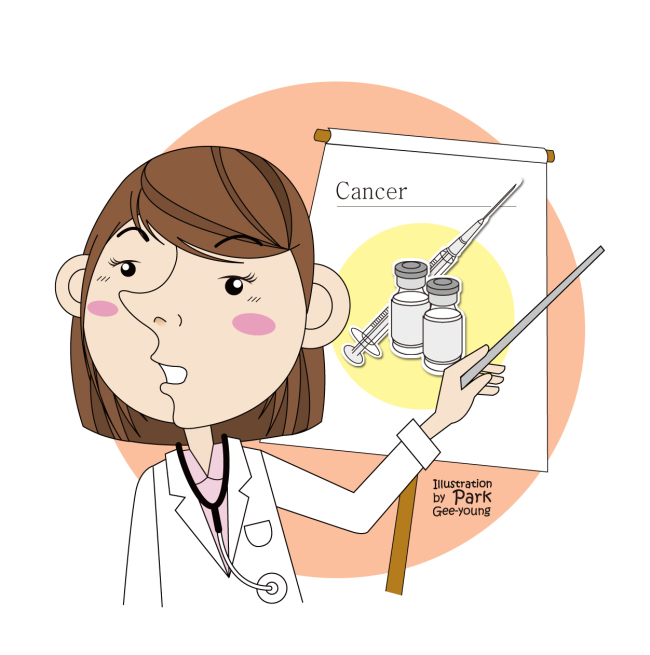
With early diagnosis and effective chemotherapy, the life expectancy of cancer patients is increasing. Therefore, it is also important to take measures to improve their general health, as well as treating cancer effectively. Cancer patients have decreased immunity due to surgery, chemotherapy and radiotherapy, which leads to an increased susceptibility to infectious diseases. For example, whereas the incidence of invasive infection caused by streptococcal pneumonia is 11 per 100,000 people, the incidence of this in lung cancer patients is 143.6 per 100,000. This can also lead to severe and potentially fatal disease, putting the health of these people at risk.
To prevent infectious diseases, it is important to receive the appropriate vaccines, as well as doing appropriate exercise and maintaining a good diet. The two major infections that can be prevented by vaccination in adult cancer patients are streptococcus pneumonia infections and influenza. In 2009, only 13 percent of non-cancer epidemic influenza patients were admitted to intensive care, compared to 35 percent of patients who did have cancer. The mortality of non-cancer epidemic influenza patients was 6 percent, while that of cancer patients was 25 percent, showing how severe and potentially fatal influenza is in cancer patients.
Cancer patients tend to avoid vaccinations because of their poorer health, but this is not the right approach. In order to successfully treat cancer and recover from it, it is very important to prevent infectious diseases, through appropriate vaccination. The effect of vaccines can be reduced while the patient is undergoing chemotherapy, so you should discuss the timing of your vaccination with your doctor. Different patients may require additional vaccines other than influenza vaccine and streptococcus pneumonia vaccines, so consult your doctor for this.
Streptococcus pneumonia
Streptococcus pneumonia is the most common cause of bacterial pneumonia. It can also cause severe infections such as septicaemia and meningitis. Bacterial meningitis is a serious infection that can lead to long-term neurological sequelae. It is also often resistant to antibiotics, so it is very important to prevent infection by vaccination.
Vaccination against streptococcus pneumonia is recommended for high-risk populations, including adults over the age of 65, patients with chronic disease, and patients with decreased immunity such as cancer patients.
There are two types of streptococcus pneumonia vaccines
● 23-valent polysaccharide pneumococcal vaccine
● 13-valent pneumococcal conjugate vaccine
Conjugate vaccines have better immunological characteristics, but their effect has not been studied clinically in cancer patients. However, considering their better immunological characteristics, it is recommended as the first-line vaccine for higher risk patients. These patients include the following:
● Leukemia, malignant lymphoma, multiple myeloma patients
● Metastatic cancer patients
● Patients who have undergone splenectomy
● Patients with concurrent chronic kidney failure or kidney disease
● Patients on immunosuppressants
Influenza vaccine
The general population is well aware of influenza vaccines. They are given widely to people over the age of 65 to prevent secondary complications of influenza and its associated mortality and hospitalization. Cancer patients are more prone to developing complications of influenza, such as pneumonia, so the influenza vaccine is recommended for cancer patients of all age groups. Cancer patients do not develop more severe adverse reactions to such vaccines, so it is recommended that cancer patients receive epidemic influenza vaccine each year.
There are two types of influenza vaccine:
● Inactivated Vaccine
● Live attenuated vaccine
The commonly used injection type vaccines are the inactivated vaccines. The immunological effect of an inactivated vaccine in elderly patients is lower, but because the live attenuated vaccine uses an active virus, it is not appropriate for cancer patients.
There is limited specific data on the best timing for giving the influenza vaccine to cancer patients undergoing chemotherapy. However, many specialists recommend that the patients receive the vaccine when their white blood cell counts have returned to normal after chemotherapy, and 2 weeks before starting the next course of chemotherapy. Antibodies are formed after vaccination, which takes approximately 2 weeks.
Herpes zoster vaccine
Another common infectious disease in cancer patients is shingles, which leads to severe pain that is more of a problem than the skin lesions it also causes. The incidence of shingles is higher in cancer patients, and these patients are more likely to develop complications such as neuralgia. In non-cancer patients, the use of the herpes zoster vaccine has been shown to reduce the incidence of shingles, as well as reducing neuralgia following shingles. The only available vaccine for shingles is a live attenuated vaccine, which is not recommended to be used in cancer patients undergoing chemotherapy. However, the patients can receive this vaccine three months after completing the course of chemotherapy. A herpes zoster vaccine for immunodeficient patients is currently under development.
Other vaccines recommended for adults:
● DPT
● Hepatitis B
● Hepatitis A
● Varicella (chicken pox)
● MMR
● HPV
Different vaccines are recommended for patients of different ages and concomitant diseases. The MMR vaccine is a live attenuated vaccine, which should be avoided in cancer patients undergoing chemotherapy. If it is needed, the vaccine should be given three months after completing chemotherapy.
To prevent infectious diseases, it is important to receive the appropriate vaccines, as well as doing appropriate exercise and maintaining a good diet. The two major infections that can be prevented by vaccination in adult cancer patients are streptococcus pneumonia infections and influenza. In 2009, only 13 percent of non-cancer epidemic influenza patients were admitted to intensive care, compared to 35 percent of patients who did have cancer. The mortality of non-cancer epidemic influenza patients was 6 percent, while that of cancer patients was 25 percent, showing how severe and potentially fatal influenza is in cancer patients.
Cancer patients tend to avoid vaccinations because of their poorer health, but this is not the right approach. In order to successfully treat cancer and recover from it, it is very important to prevent infectious diseases, through appropriate vaccination. The effect of vaccines can be reduced while the patient is undergoing chemotherapy, so you should discuss the timing of your vaccination with your doctor. Different patients may require additional vaccines other than influenza vaccine and streptococcus pneumonia vaccines, so consult your doctor for this.
Streptococcus pneumonia
Streptococcus pneumonia is the most common cause of bacterial pneumonia. It can also cause severe infections such as septicaemia and meningitis. Bacterial meningitis is a serious infection that can lead to long-term neurological sequelae. It is also often resistant to antibiotics, so it is very important to prevent infection by vaccination.
Vaccination against streptococcus pneumonia is recommended for high-risk populations, including adults over the age of 65, patients with chronic disease, and patients with decreased immunity such as cancer patients.
There are two types of streptococcus pneumonia vaccines
● 23-valent polysaccharide pneumococcal vaccine
● 13-valent pneumococcal conjugate vaccine
Conjugate vaccines have better immunological characteristics, but their effect has not been studied clinically in cancer patients. However, considering their better immunological characteristics, it is recommended as the first-line vaccine for higher risk patients. These patients include the following:
● Leukemia, malignant lymphoma, multiple myeloma patients
● Metastatic cancer patients
● Patients who have undergone splenectomy
● Patients with concurrent chronic kidney failure or kidney disease
● Patients on immunosuppressants
Influenza vaccine
The general population is well aware of influenza vaccines. They are given widely to people over the age of 65 to prevent secondary complications of influenza and its associated mortality and hospitalization. Cancer patients are more prone to developing complications of influenza, such as pneumonia, so the influenza vaccine is recommended for cancer patients of all age groups. Cancer patients do not develop more severe adverse reactions to such vaccines, so it is recommended that cancer patients receive epidemic influenza vaccine each year.
There are two types of influenza vaccine:
● Inactivated Vaccine
● Live attenuated vaccine
The commonly used injection type vaccines are the inactivated vaccines. The immunological effect of an inactivated vaccine in elderly patients is lower, but because the live attenuated vaccine uses an active virus, it is not appropriate for cancer patients.
There is limited specific data on the best timing for giving the influenza vaccine to cancer patients undergoing chemotherapy. However, many specialists recommend that the patients receive the vaccine when their white blood cell counts have returned to normal after chemotherapy, and 2 weeks before starting the next course of chemotherapy. Antibodies are formed after vaccination, which takes approximately 2 weeks.
Herpes zoster vaccine
Another common infectious disease in cancer patients is shingles, which leads to severe pain that is more of a problem than the skin lesions it also causes. The incidence of shingles is higher in cancer patients, and these patients are more likely to develop complications such as neuralgia. In non-cancer patients, the use of the herpes zoster vaccine has been shown to reduce the incidence of shingles, as well as reducing neuralgia following shingles. The only available vaccine for shingles is a live attenuated vaccine, which is not recommended to be used in cancer patients undergoing chemotherapy. However, the patients can receive this vaccine three months after completing the course of chemotherapy. A herpes zoster vaccine for immunodeficient patients is currently under development.
Other vaccines recommended for adults:
● DPT
● Hepatitis B
● Hepatitis A
● Varicella (chicken pox)
● MMR
● HPV
Different vaccines are recommended for patients of different ages and concomitant diseases. The MMR vaccine is a live attenuated vaccine, which should be avoided in cancer patients undergoing chemotherapy. If it is needed, the vaccine should be given three months after completing chemotherapy.

By Peck Kyong-ran
The author is a doctor at Division of Infectious Diseases at Samsung Medical Center and a professor of Sungkyunkwan University School of Medicine. ― Ed.
The author is a doctor at Division of Infectious Diseases at Samsung Medical Center and a professor of Sungkyunkwan University School of Medicine. ― Ed.
-
Articles by Korea Herald








![[Weekender] Korean psyche untangled: Musok](http://res.heraldm.com/phpwas/restmb_idxmake.php?idx=644&simg=/content/image/2024/05/02/20240502050841_0.jpg&u=)









![[Eye Interview] 'If you live to 100, you might as well be happy,' says 88-year-old bestselling essayist](http://res.heraldm.com/phpwas/restmb_idxmake.php?idx=652&simg=/content/image/2024/05/03/20240503050674_0.jpg&u=)
